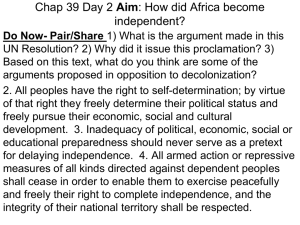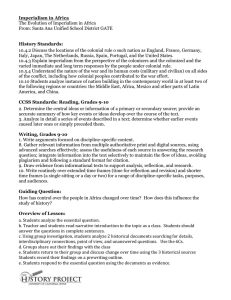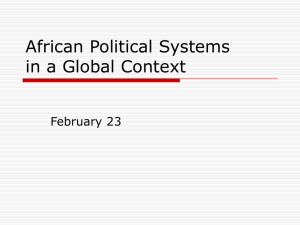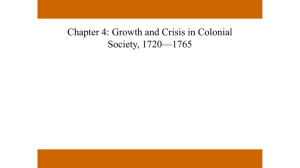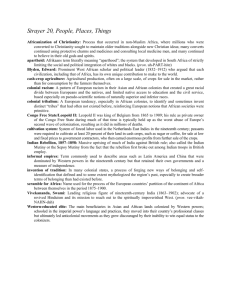Decolonization
advertisement
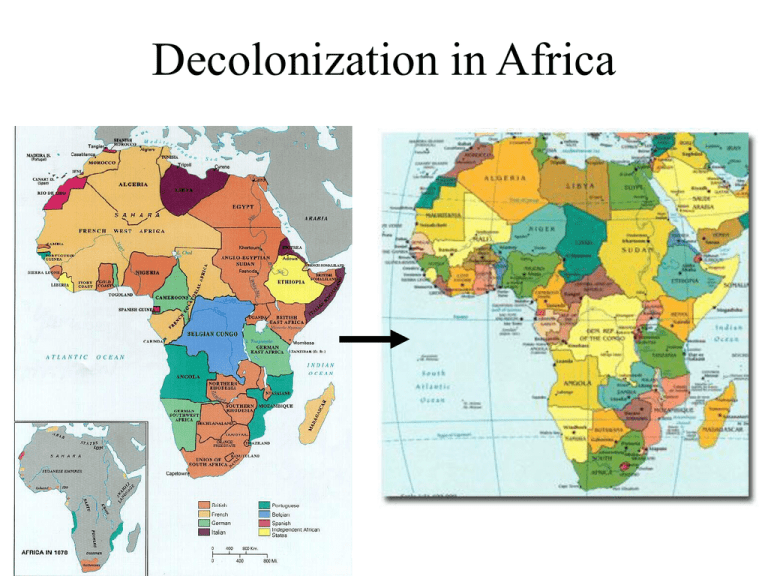
Decolonization in Africa Why did so many African countries successfully achieve independence after World War II? • It was too difficult and expensive for European powers to hold onto their colonial possessions • The charter of the newly created UN guaranteed colonial populations the right to self determination • The participation of African soldiers in WWII led many to want independence • Newfound pride in African heritage and culture emerged • Resentment of colonial rule and economic exploitation grew How was independence achieved? • Some transitions were peaceful – Ghana • 1st to declare independence in sub-Saharan Africa under leadership of Kwame Nkrumah How was independence achieved? • Some transitions were violent – Algeria • Fought against France in a long and bloody war – Kenya • A rebel group called the Mau Maus terrorized British settlers in Kenya • Jomo Kenyatta arrested and jailed • Kenyatta later became Kenya’s first leader Questions • Were the independence movements in Africa similar or different? • How do the African independence movements compare to India’s independence movement? And one country, despite already being independent, struggled with other issues… Origins of Apartheid • Legalized segregation in South Africa enacted in 1948 • Rooted in the racist attitudes of the early Dutch settlers (later called Afrikaners) towards the Africans • Based on living and working conditions of the mines • Government created a brutal police state to enforce it Life Under Apartheid Life under Apartheid www-cs-students.stanford.edu/~cale/cs201/apartheid.hist.html http://www.un.org/av/photo/subjects/apartheid.htm http://www.apartheidmuseum.org/ Resistance to Apartheid • African National Congress – Anti-apartheid group – Peaceful, but has a militant wing • • • • • Strikes Boycotts Protests Civil Disobedience Nelson Mandela arrested in 1964 End of Apartheid • 1980s: economic sanctions and international pressure increase • 1990: Mandela released from prison after almost 30 years • 1994: national elections held – ANC wins by a landslide, Mandela becomes president • Today, South Africa is still trying to create economic equality for its people Decolonization in Africa “For if the last shall be first, this will only come to pass after a murderous and decisive struggle between the two protagonists.” –Frantz Fanon Which of the examples below support Fanon’s quote? Which refute it? When you have finished the questions, draw one symbol or picture to represent each country’s independence efforts. Algeria Egypt Although freed from colonial control in 1922, Egypt did not take control of its own Suez Canal until 1956 Kenya Ghana South Africa Decolonization in Africa Why did decolonization in Africa take place after WWII? Colonies were too expensive to maintain. Also, the charter of the newly created ___________________________guaranteed colonial populations the right to self determination. Also, the participation of African soldiers in ______________________ led many to want independence while newfound pride in African heritage and culture emerged. Finally, _________________________ of colonial rule and economic exploitation grew. Draw one symbol or picture to represent each country’s independence efforts. Algeria Egypt Although freed from colonial control in 1922, Egypt did not take control of its own Suez Canal until 1956 Kenya Ghana South Africa Already independent, but suffered under the unfair system of legal segregation known as ___________________ Decolonization in Africa Why did decolonization in Africa take place after WWII? Colonies were too expensive to maintain. Also, the charter of the newly created ___________________________guaranteed colonial populations the right to self determination. Also, the participation of African soldiers in ______________________ led many to want independence while newfound pride in African heritage and culture emerged. Finally, _________________________ of colonial rule and economic exploitation grew. Note down information about each country’s independence efforts. Algeria Egypt Although freed from colonial control in 1922, Egypt did not take control of its own Suez Canal until 1956 Kenya Ghana South Africa Already independent, but suffered under the unfair system of legal segregation known as ___________________. ___________________ becomes the first black president in 1994. Freedom Now Video • • • • • • • • • • • • • • • • • • • • • 01:40 Gandhi campaigns for freedom from British rule. 1930s see mass marches, boycotts, and civil disobedience. 02:30 Post WWII: The beginnings of shifts in power. 02:50 August 1947: India gains independence. 05:50 Fights break out between Hindu India and Muslim Pakistan. 07:10 1948: Gandhi is assassinated. 07:40 European powers, including France and Portugal, are still control many colonies. 10:40 British consider themselves benefactors and are determined to keep African colonies. 14:10 Aspirations of Africans change after WWII, Africans are encouraged by India's fight for freedom. 15:50 Struggle for freedom begins in the Gold Coast. 18:00 1951: Gold Coast holds a general election for a local assembly, marking the beginning of the end of British rule in Africa. 19:00 East African Colony - Kenya - British citizens are determined to remain in the east African colony of Kenya. 20:10 Secret organization of Mau Mau fight the British. 24:20 1956: France and Britain cannot take Suez Canal by force. Nasser proves that Europeans can't continue their rule. 26:05 1957: Gold Coast gains independence and becomes Ghana. 31:50 French colonies attempts integration; offer French citizenship to residents of a select few. 33:00 Algeria refuses to become a part of greater France. 36:10 Full independence from France gained by several colonies. 37:40 Ghana is a nation with new airlines, communications, roads, and schools -- and corrupt politians. 43:30 1960 - Congo (Zaire) gains independence from Belgium. 47:00 British refuse to give up control of Rhodesia. 48:30 1975: Angola and Mozambique find freedom from Portugal. http://www.youtube.com/watch?v=fie7H9EThUQ
